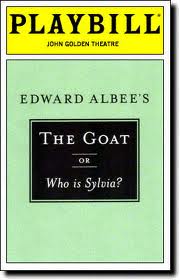Having learned of high schools terminating productions and firing teachers over everything from Legally Blonde to The Laramie Project, it hardly comes as a surprise that Edward Albee’s Tony Award-winning play The Goat, or Who Is Sylvia? came under fire last week at Cactus Shadows High School in Scottsdale, Arizona. Where surprise comes into play is that the sentinels of censorship sprang to action not over a production of the work, but over it being read in an advanced drama course for which students could receive college credit.
I’d have to admit that The Goat probably isn’t typical high school fare, and shouldn’t necessarily be in the general reading for all students. But for students prepared to work at a college level, Albee’s writing is important if not essential. I happen to be a particular fan of the play, finding it so compelling in its original Broadway production that I took the unprecedented step (for me) of paying box office rates to see it twice. In my personal hierarchy of Albee plays, it is second only to Who’s Afraid Of Virginia Woolf?, with which it shares many characteristics. Is there “vulgar” language? Yes. Does it invoke (but not portray) bestiality and touch upon incest and pedophilia? Yes. But it does not advocate those taboos; it deploys them in service of a deeper meaning. Serious acting students working at a college level should be prepared to grapple with such material.
 Upon reading and watching press accounts of the Scottsdale challenge to The Goat, they at first appear similar to other protests against certain works in high school theatre, but the situation at Cactus Shadows escalates to a whole new level. Even though students admit to being offered alternative material, a preemptive acknowledgement that some might wish to opt out of The Goat, complaints arose from some who didn’t exercise that option. When school board members advised concerned parents to express their dismay to the principal and the teacher, they instead brought in the police. In turn, the police allowed the irate parents making the complaint to directly confront students about the teacher and the play, which I can’t help but think is a violation of any sensible school policy, let alone due process. Yet the Scottsdale Police Department says there is no complaint on file. What gives?
Upon reading and watching press accounts of the Scottsdale challenge to The Goat, they at first appear similar to other protests against certain works in high school theatre, but the situation at Cactus Shadows escalates to a whole new level. Even though students admit to being offered alternative material, a preemptive acknowledgement that some might wish to opt out of The Goat, complaints arose from some who didn’t exercise that option. When school board members advised concerned parents to express their dismay to the principal and the teacher, they instead brought in the police. In turn, the police allowed the irate parents making the complaint to directly confront students about the teacher and the play, which I can’t help but think is a violation of any sensible school policy, let alone due process. Yet the Scottsdale Police Department says there is no complaint on file. What gives?
The school superintendent, quickly distancing herself from the teacher, says that she’s investigating how the play was brought into the classroom, as if it was smuggled in under cover of night. To the contrary: the play was on a list of works submitted in advance to parents, for their signature. Could the parents have all been expected to know the material and judge their comfort accordingly? Of course not, even if you accept the concept that parents have the right to individually approve curricula. But the teacher, who has been placed on paid administrative leave, could hardly be accused of subterfuge. While certainly the superintendent doesn’t check every lesson plan, is it possible that the teacher of the course submitted the reading list to parents for sign off without passing it by any other member of the faculty? I’d be surprised.
I’m really stunned that the school’s policy is apparently to take a teacher out of the classroom over any complaint until it’s investigated. This is an intellectual issue, not a student safety one. How is such a matter investigated and how long should it take? How does it rise to being a police matter?
The language of press reports from KPHO TV and The Arizona Republic have no doubt inflamed the situation, since they elide the gap between discussing hot button topics and portraying, let alone endorsing, them; certainly any metaphorical meaning is cast aside in the rush to grab eyeballs. Clearly neither reporter knows much about Albee (and to be fair, can’t be expected to) but they take far too much at face value from the conversations they have had about the controversy. Regretfully, the teacher sold Albee short by saying The Goat is an absurdist play; it may be harsh and posit extreme situations, but it is rooted in reality. The Goat is not Ubu Roi or The Bald Soprano.
 Read the comments on the news stories linked here, because they suggest that the complaints are far outweighed by supporters of the teacher and the class. But that’s not evident from the stories themselves, especially the video segments, which emphasize the dissenters, not those who think the situation has been precipitated by a vocal minority. Editorial balance is one thing, but misrepresenting the balance of public opinion is another.
Read the comments on the news stories linked here, because they suggest that the complaints are far outweighed by supporters of the teacher and the class. But that’s not evident from the stories themselves, especially the video segments, which emphasize the dissenters, not those who think the situation has been precipitated by a vocal minority. Editorial balance is one thing, but misrepresenting the balance of public opinion is another.
As I read The Goat again, I was struck by how much of the dialogue in the play resembles an interview – or even a conversation – with Edward Albee, a daunting experience I’ve had the challenge and pleasure of undertaking. For Albee, there are no easy answers; he actually seems to delight in not providing any, despite writing some of the most probing theatrical work of the past half-century. Ask Edward what The Goat is about and I’d lay odds that his answer would be, “About two hours.” This only deepens the mysteries of the play.
The study and practice of theatre is not about easy answers. What a shame that a teacher in Scottsdale challenged his advanced students with some difficult questions and was taken out of the classroom as a result, and both he and Edward Albee are presumed guilty unless proven innocent.
P.S. When I attended high school in the late 70s, Albee’s The Zoo Story was on the reading list for English class, not for a drama or advanced placement course. When I saw the play again, for the first time in many years, at Second Stage in 2007, I was struck by the darkness and complexity of the material and marveled that it had been studied in a suburban high school classroom – without opposition – almost 30 years earlier. I am also indebted to everyone who had a hand in making that happen.
Update, October 15, 3 p.m. eastern time: I am pleased to report that the teacher suspended for teaching The Goat, Andrew Cupo, has been returned to the classroom, as reported in the Arizona Republic. But this is far from a victory, as from now on, Cupo will be required to clear every text he uses with the principal, bypassing (it would seem) a departmental chair, who I imagine normally has that responsibility. I believe in proper approvals, but has a special status been carved out for Cupo? In addition, superintendent Debbi Burdick has said that, “no plays that include suggestive sexual information, excessive profanity, suggestive sexual undertones, or that would be considered controversial in a high-school setting will be used for any reason.” I wonder: is this content policy in place solely for Cupo and drama, or for all literature taught at Cactus Shadows? Regardless, the long shadow of censorship has been strengthened at the school, forcing Cupo to seek approval for and second guess his every decision and depriving students of some of the greatest works of drama.
My thanks to Linda Essig for bringing this situation to my attention and for sharing the local news accounts. An Arizona resident, she has also written “An Open Letter To The Cave Creek School District,” which includes Cactus Shadows High School.




